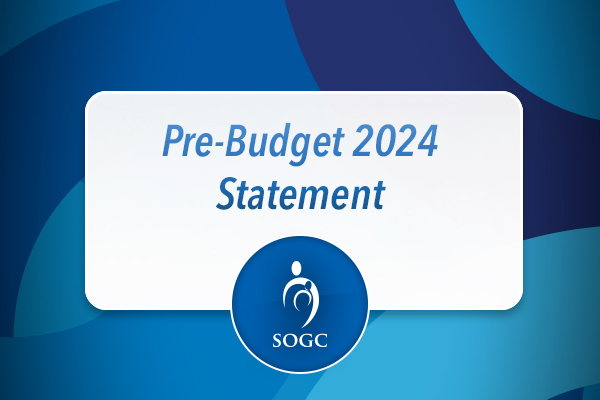
Opinion letter by the Society of Obstetricians and Gynaecologists of Canada (SOGC)
Ottawa, April 15, 2024 -- Today, somewhere in Canada, a woman will have to choose between buying groceries, paying her electrical bill, filling up her gas tank – or paying for her birth control.
It’s no secret the rising costs of almost all goods and services have become a significant burden for many Canadians, but nine million women of childbearing age in Canada bear an additional cost, one which often flies under the radar, but is no less fundamental to her way of life: the costs of preventing unintended pregnancy.
That is why the Society of Obstetricians and Gynaecologists of Canada (SOGC) was pleased the federal government announced last month it intends to include universal coverage for a full range of contraceptives as part of the National Pharmacare Framework legislation; Bill C-64. This is a measure the SOGC has long been advocating for, as access to contraception is not only a matter of reproductive rights but is also a fundamental aspect of public health and equity.
While we welcome and applaud the intent and first steps that this announcement represents, the next steps will be most critical in the way Canadian women and health professionals measure the federal government’s commitment to women’s health and reproductive health options.
We need to see urgency in passing this legislation to ensure the commitment to free contraception is enshrined into law as soon as possible. We need to see a firm commitment by the federal government to work collaboratively with provinces, territories and First Nations to negotiate an implementation plan that ensures women and gender diverse individuals from all walks of life in every corner of the country have access to the birth control options that work best for them. And we need to see a dedicated and sufficient commitment of federal funds to ensure work to implement this policy will be inclusive and comprehensive.
Why is this so important?
Contraception allows women to plan their lives, their families, and their pregnancies. They are more likely to finish school, participate more fully in the workforce, enjoy more economic stability and have healthy pregnancies when they do choose to have children.
But financial barriers can limit birth control options for many women. Canada currently has a patchwork approach to coverage, which varies according to income, where you live, or on your partner’s coverage. This forces some individuals to choose the cheapest method, not necessarily the most effective, or to use no method of contraception at all. This sometimes results in an unintended pregnancy. We see this every week in our practices. We can do better than this for Canadian women.
Approximately 40 per cent of pregnancies in Canada are unintended. This doesn’t just impact women and their families, it affects the economy. The direct cost of unintended pregnancies in Canada is estimated to be at least $320 million per year – a figure that doesn’t include the downstream costs to society or to parents.
When British Columbia made prescription birth control free last year, modelling estimates showed cost neutrality partway through year two of funding. By 2027, B.C. residents will save $5 for every $1 invested in contraception. The economic case is clear. Universal coverage of a full range of contraceptives will ensure that women are empowered with the tools to better control their futures. That makes it an investment in Canada’s future.
As the national voice for women’s health, the SOGC urges federal government to ensure dedicated funds are committed to universal coverage of contraceptives in Budget 2024. Provincial governments must work with the federal government and embrace a new model of coverage to ensure that women no longer face barriers depending on where they live. Many of our patients have been asking when this will become available, because it is never soon enough for those in difficult economic situations.
Announcing this measure and introducing legislation is an important first step – but now we need to see tangible actions to demonstrate a commitment to funding and passing this legislation to ensure Canadian women’s reproductive health care needs and their futures are a priority and will continue to be prioritized for future generations.
Sincerely,
Dr. Amanda Black, President, SOGC
Dr. Diane Francoeur, CEO, SOGC